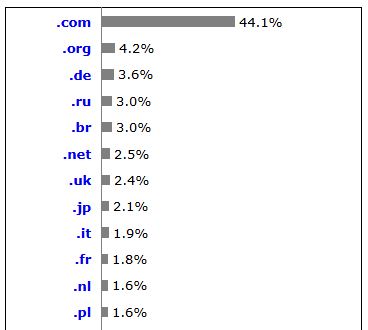How thoroughly should you think about your domain name?
Is it really that important?
If you have a quality website and business, people will visit your site no matter what the domain is, right?
Well, not so fast…
You see, your domain name is the key element of your website. It can make or break you, so it’s crucial to choose a domain name that works for your business heading into 2026. But wait, why is your domain name so important?
Your domain name is your website’s “first impression.”
It’s often the first thing visitors notice and a well-chosen domain name can leave a strong positive impact. On the flip side, a poorly selected one can drive potential visitors away before they even explore your content. Most importantly, your domain name defines your brand. It’s a golden opportunity to establish your identity online and build recognition in an increasingly competitive digital landscape.
The right domain name can enhance trust, credibility and memorability—especially important as voice search and AI-driven discovery reshape how users find websites in 2025 and beyond. These are just a few of the many reasons why your domain name matters so much. But how do you pick the perfect domain name?
That’s exactly what we’re going to guide you through today.
9 Tips for Choosing a Domain Name
- Choose the right domain extension
- Keep it brandable
- Shorter is better
- Easy to spell
- Avoid hyphens and numbers
- Use “niche” keywords that reflect your website
- Think long-term, not short term
- Ensure it’s not trademarked or already in use
- Use domain name generators for fresh ideas
How to Come Up With a Good Domain Name
1. Choose the right domain extension
When it comes to domain name extensions, one thing remains clear heading into 2026: “.com” is still the gold standard. Research from W3Techs shows that 46% of all domains use the “.com” extension as of late 2025.

Why?
Because it’s the most familiar, widely recognized, and easiest to remember. People naturally associate “.com” with credibility and professionalism. While other extensions like “.net” and “.org” can work well for specific purposes, your website will likely perform better with a “.com” extension. It’s the safest and most reliable choice for 2026 and beyond.
Our recommendation: Choose a “.com” domain if possible. If it’s unavailable, consider “.net” or “.org” as alternatives. Industry-specific extensions like “.tech,” “.ai,” or “.io” have gained traction in 2025 for startups and tech companies, but proceed with caution—they may still confuse mainstream audiences. If your preferred “.com” is taken, it’s often better to brainstorm a new domain name entirely. Avoid obscure extensions like “.club,” “.space,” or “.pizza” that lack trustworthiness and recognition.
2. Keep it brandable
A creative, brandable domain name is always better than a generic one.
Your domain name is the cornerstone of your online identity—it’s how visitors find, remember, and share your business in 2026’s crowded digital marketplace. A strong domain sets the foundation for your brand, especially as AI-powered search and social discovery continue to evolve.
Brandable vs. Generic Domains
The key difference lies in uniqueness: Brandable domains are distinctive and memorable, helping your business stand out. Generic domains often rely on keywords, making them bland and forgettable.
Consider this: Can you easily distinguish between Healthinsurance.net, Newhealthinsurance.com, and Healthinsurancesort.com? Likely not.
These generic names are overloaded with keywords, lack meaning, and fail to leave a lasting impression. Nobody raves about Insurance.com because it feels generic and uninspired. On the other hand, domains like UnitedHealthCareOnline.com or Anthem.com resonate because they represent something unique and trustworthy—names that stick in memory and build brand equity.
Tips for Finding a Brandable Domain Name:
- Invent new words. Create unique and catchy terms, just like Google, Stripe, and Notion did.
- Use existing words. Explore a thesaurus for meaningful, interesting words that align with your brand identity.
- Try domain name generators. Modern AI-powered tools can help brainstorm creative, brandable domains based on your ideas and keywords. (We’ll share some top domain name generators later in this post.)
- Consider pronunciation. With voice search accounting for more queries in 2025, ensure your domain sounds natural when spoken aloud.
3. Shorter is better
When it comes to domain names, shorter is almost always better.
Research from DomainRegistration.com.au shows that the most popular domain names average around 12 characters. (In this context, “popular” refers to the amount of web traffic a site receives.)
This data highlights the importance of keeping your domain name concise—a principle that remains critical heading into 2026, especially for mobile users and voice-activated searches.
Tips for Domain Length:
- Aim for 6-14 characters—the shorter, the better.
- Keep in mind that many shorter domains were claimed long ago and often sell for thousands or even tens of thousands of dollars in 2025. If a short name isn’t available, focus on making it brandable and memorable instead.
- Prioritize mobile-friendliness—shorter domains are easier to type on smartphones and less prone to typos.

For example, our domain, websitesetup.org, is exactly 12 characters—right in the sweet spot for memorability and usability.
4. Easy to spell
Think about some of the most popular websites in the world—what comes to mind? Google, Facebook, Amazon, Instagram, ChatGPT… One thing they all have in common?
They’re easy to spell.
Your domain name should be simple enough for visitors to type without hesitation. If you find yourself repeatedly explaining how to spell it, it’s too complicated. A complicated domain increases the risk of potential visitors mistyping it and landing on another website—or worse, a competitor’s site.
This matters even more in 2026 as voice search continues to grow. When users ask their smart speakers or AI assistants to find your site, a hard-to-spell domain creates friction.
Here’s a quick test: Share your potential domain name with 10 people and ask them to spell it after hearing it once. If several of them struggle, it’s time to rethink and simplify. Consider how it sounds phonetically—does it translate clearly from speech to text?
5. Avoid hyphens and numbers
A good domain name should be easy to spell and pronounce—hyphens and numbers make both harder.
Imagine trying to explain Facebook if it had a hyphen: “Check out this new site, Face-Book. Don’t forget the hyphen between ‘Face’ and ‘Book.'”
Chances are, Facebook wouldn’t have taken off as quickly with that kind of confusion. The takeaway? Your domain name should be smooth, memorable, and easy to share—especially important for 2026’s social-first, voice-activated browsing habits.
Hyphens and numbers disrupt that flow and create ambiguity. When someone hears “5” in your domain name, they don’t know if you mean the number “5” or the word “five.” Stick to letters to keep it simple, clean, and impactful.
6. Use “niche” keywords that reflect your website
Including niche keywords in your domain name can help communicate your website’s focus and potentially improve SEO, though Google’s algorithms in 2025 prioritize brand signals and user experience over exact-match domains.
For example, our site is all about web development and helping people create websites. That’s why we included “website” in our name—WebsiteSetup. While domains like website.com or website.org weren’t available, we crafted a name that reflects our niche and purpose.
Be Strategic with Keywords:
Avoid awkwardly stuffing keywords into your domain; this can make it sound generic and forgettable (as we discussed earlier). Modern search algorithms in 2025 are sophisticated enough to understand topical relevance without requiring exact keyword matches in your domain.
If you use keywords, position them naturally. Tools like Google Keyword Planner or KeywordTool.io can help you discover relevant terms to incorporate seamlessly into your domain. Balance keyword relevance with brandability—your domain should work as a brand name first, SEO asset second.
7. Think long-term, not short term
Choosing a domain name is a major commitment—it’s like marrying your brand. Your domain will define your business for years to come, so it’s critical to get it right the first time. Changing your domain later can be costly, both financially and in terms of branding equity and SEO rankings. It’s a headache you’ll want to avoid in 2026 and beyond.
Plan for the Future:
When selecting your domain name, think about your long-term vision and growth trajectory.
For instance, if your business focuses on helping companies optimize their websites for SEO, a domain like OptimizedSEO.com might seem perfect today. But if you anticipate expanding into broader digital marketing services—such as social media management, email marketing, content creation, or AI-powered automation—this domain could feel too limiting within a year or two.
Avoid Boxing Yourself In:
Don’t tie your domain too closely to a specific niche, technology, or trend if you foresee growth into other areas. The digital landscape evolves rapidly—what’s hot in 2025 may be outdated by 2027. Choose a name that aligns with your current mission while leaving room for future expansion and pivots.
Pro Tip: Always keep your long-term vision in mind to ensure your domain remains relevant, flexible, and valuable as your business evolves. Think five to ten years ahead, not just the next six months.
8. Ensure it‘s not trademarked or already in use

Before finalizing your domain name, make sure it’s available on social media platforms and isn’t already trademarked.
Having the same name across your domain and social media accounts is crucial for building a consistent brand in 2026. This helps visitors, fans, and customers easily find you across the web and fosters familiarity and trust.
Why It Matters:
- Legal protection: Using a name already trademarked could lead to cease-and-desist letters, lawsuits, or forced rebranding—expensive problems to avoid.
- Brand consistency: If the name is taken on major platforms like Instagram, TikTok, LinkedIn, or X (formerly Twitter), it creates confusion and dilutes your brand identity.
- Username availability: Check availability on all relevant platforms before committing. Tools like Namechk or KnowEm can help you search multiple platforms simultaneously.
Due diligence now saves major headaches later. Search the USPTO trademark database and conduct thorough social media checks before you purchase your domain.
9. Use domain generators for fresh ideas
By now, you should have a general idea of some potential words for your domain name.
However, some of these ideas might already be taken, trademarked, or not quite the right fit in terms of sound or style. That’s where modern domain name generators come in handy—and they’ve gotten significantly more sophisticated in 2025.
These tools can transform your ideas into fresh, creative, and available domain names. Many now leverage AI and machine learning to suggest brandable options that align with current naming trends and linguistic patterns.
What Modern Generators Offer:
- AI-powered suggestions that understand context and brand positioning
- Real-time availability checking across multiple extensions
- Phonetic analysis for voice search optimization
- Trademark screening to avoid legal issues
- Social media handle availability for consistent branding
Here are some top domain name generators to try as you head into 2026. These tools can spark creativity and help you discover options you might never have considered on your own.
Don’t settle for your first idea—experiment with multiple generators to find a domain name that truly represents your brand’s future.
